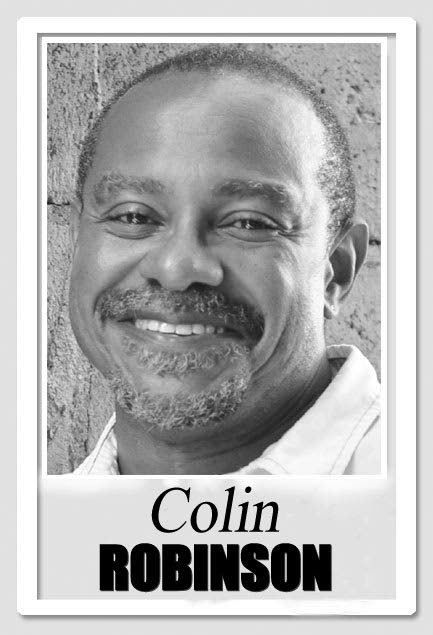The marginal party

Marlene McDonald’s arrest drives another nail into the PNM’s re-electoral coffin.
Just like May 2010 at Rienzi, I parked at a distance and fought through the rowdy crowds to Balisier House one late September 2015 night, to be at the centre of celebrating a needed change in government. I’m pretty clear I won’t be in either place come 2020. Or whenever the next election result is called.
I claim no bona fides at political punditry. But when Winsford James can get quoted on homophobia and the ------man Chief Justice, I feel no shame wagging my tongue in the electoral circus ring.
What do I imagine, as the nation faces picking our next government?
Well, there’s always the possibility that we might not go to the polls. Trump may invade Venezuela, and conflict spill across the Columbus Channel.
With or without that trigger, the current sense of descent into chaos might yield the one thing, besides our squandered fossil-fuel wealth, that’s actually delivered transformational development in the post-independence Caribbean: the kind of anti-capitalist revolution we also squandered in Grenada, and that’s fast running out of steam in Cuba.
A 2020 UNC electoral victory is both painful and difficult to contemplate. Not because I have confidence that the competence of the current government or judicial system will substantiate widely-shared assumptions of the last regime’s gross corruption.
While the “People’s Partnership” can claim small – but no really brave – policy achievements, they’re overwhelmed by the hallmark of their governance: the deliberate patronage and asset-liquidation of a short-sighted vision of re-election. Yet the party’s Trumpian turn to rank tribalism and legislative obstructionism in defeat and opposition undermines whatever hope a selfish non-Indo voter might still hold for an unequal piece of that patronage. Their failure in office to deliver anything particularly meaningful for the social-justice coalition which along with their Indian base got them elected has lost them the trust of key voting blocs the PNM is still scared to court. Their message to most of these interest groups was: Re-elect us first. And they won’t.
Kamla’s leadership appears to have survived predictions of internal combustion. A breakaway party would only seal a PNM victory, guaranteeing both UNC factions defeat.
The PNM doesn’t stand for much either. The adage coined after the first disappointing months of this term remains true: The one good thing about this government is the last one was worse.
It’s hard to think quickly of a single political accomplishment. Myriad blunders come to mind easily. Combing through four years’ legislation on Parliament’s website, there’s the gem of the children’s court; but nothing stand-out touching voters’ daily lives. Going sector by sector, minister by minister – Moses, Cudjoe, Garcia, McDonald, Dillon, Crichlow-Cockburn – is an exercise in pain.
This government’s best accomplishment perhaps is avoiding economic collapse; but its finance minister’s noxious superciliousness eviscerates most of that political dividend.
No new interest groups have been brought under the tent, policy choices still driven by fear of business and ecclesiastic kingmakers. Marijuana’s still criminalised, the school system fails most students, public health’s friendliness has grown marginally at best, most government services remain bureaucratic. SuperG’s made no dent in the wanton violence. And we’re repeatedly lectured like children.
Five more years of stasis, ineptitude, backsliding and all-but-proven graft might be the least of evils; but PNM’s greatest challenge will be getting loyalists to turn out. Patrick Manning failed.
It’s challenging to imagine any “third party” commanding electoral victory. COP’s 2007 success depended on eroding the UNC base. Unlike MSJ, its leaders haven’t successfully rebranded post-PP.
Other parties are hinged to their leaders’ charisma. Patriotic Front’s Mickela Panday has disappeared from the headlines. The toxicity of PEP’s Phillip Edward Alexander’s is widely self-evident. Despite considerable union-organising ranks, MSJ’s dismal two-digit showings in 2013 local government races show it can’t muster the ground-game electioneering requires; which only the tribal parties do. (And if OWTU could lose Petrotrin…) Besides, MSJ’s optics still scream “doctrinaire bearded old men.” Then there’s Nikoli Edwards’s Progressives, a welcome escape from neoliberal cautiousness, who’ve not convinced even generous listeners of any depth of policy analysis, but have of their considerable greenness.
But we think of elections wrong-headedly. I don’t vote, for example, in Diego Martin Central. I believe spoiling my ballot with a political message is more useful; my one vote wouldn’t keep or put the PNM in office. General elections aren’t won nationally; in Trinidad, they’re decided by races in ten or so “marginal” constituencies of the 39, among them: Barataria-San Juan, Chaguanas East, Cumuto-Manzanilla, La Horquetta-Talparo, Moruga-Tableland, Pointe-a-Pierre, San Fernando West, St Joseph, Tunapuna.
That’s where upstart parties should be focused – with visionary, hard-working and personable candidates who are home-grown and have local track records. Win enough of those seats (it might take just 35 per cent of voters), and you decide whether the UNC or PNM forms the government; and on what terms.

Comments
"The marginal party"